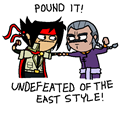|
So, itís important to not get wires crossed - this discussion was prompted by freelance rates. At the point where youíre hiring people to work on your thing, you should pay them a fair wage. I donít think anyone disagrees with that, right? On the other hand, a creator working on something they holds the rights to can do whatever they like with their free time. People are going to create things because they have a passion to create. Itíd be nice to have UBI so that they could do that without having to worry about putting food on the table, but there we are. But if youíre treating this industry as a hobby, please work on your own thing - youíre doing yourself and others a disservice if you use your free time to bulk out someone elseís product line and you donít even ask for a fair wage for it.
|
|
|
|

|
| # ? May 25, 2024 22:26 |
|
Flavivirus posted:So, it’s important to not get wires crossed - this discussion was prompted by freelance rates. At the point where you’re hiring people to work on your thing, you should pay them a fair wage. I don’t think anyone disagrees with that, right? All of which is all very well to say, but if those people you're hiring are freelancers, who set their own prices, and the prices they set are not enough to give them a fair wage... how would you know?
|
|
|
|
This is a real good post.
|
|
|
|
Elector_Nerdlingen posted:So I'm not sure how someone in my position would start. Make free stuff until I'm a known quantity then Kickstarter? Instead of short-sightedly selling it for a couple of bucks just to get $50 in DTRPG credit, if you're really interested in making and selling a game, build a portfolio (a few free sample pieces, like microgames or houserules or essays about RPG design), then put your game up for sale (e.g. in the form of a Kickstarter campaign to fund art and layout) for what you feel is a fair price for the amount of time and effort you spent working on it, not the price that's metastasised as the industry average despite pretty much everyone acknowledging that it's way too low. Lemon-Lime fucked around with this message at 11:29 on Feb 25, 2019 |
|
|
|
thespaceinvader posted:All of which is all very well to say, but if those people you're hiring are freelancers, who set their own prices, and the prices they set are not enough to give them a fair wage... how would you know? Thatís why Iím very much in favour of freelancers unionising together, like weíre talking about, so that thereís an industry-wide understanding of what a fair wage is. On top of that, I can always offer a living wage, calculated based on government guidelines and the amount of hours Iíve logged on projects of a similar size.
|
|
|
|
I'd ask again, how would you know? Especially for things like art piece-work, one person's workflow and another's can be very different, so depending on who you hire to produce a given image, it might take one 2 hours, and one 10, and if you hire them by the piece rather than the hour (which most if not all artists I've seen doing commission work do), how do you know whether you're paying them a living wage when you agree to commission the work? DOubly so in an industry which has a lot of hobbyists working on the cheap, who aren't even trying to work for a living wage. I say this because I'm entering a world of actually charging money for piece-work creativity, and it's super hard to know what to charge, because I'm new, inexperienced, can't guarantee the quality and safety of my work, but also have high costs (the workshop space I rent, and the materials I use) and want to charge a living wage for my time - but not to overcharge and price myself out of the market. So it's likely I'll end up under-charging for my time, because if I charge what it actually costs at even a reasonable rate - £10 an hour is less than what I'd earn in an office job, which requires markedly less and more commonplace expertise - I'd end up charging more than the going rate on the market, for what is probably a lower quality product at this stage in my career. So the likelihood is that like many creative people I work an office job and radically undercharge for my time, just enough to actually make the material costs and workshop space break even, and fund what are effectively hobbies, rather than a living. It's something of a difficult issue. thespaceinvader fucked around with this message at 11:37 on Feb 25, 2019 |
|
|
|
I'm not going to lie, art is much harder for me to estimate than writing. I'd imagine that artists unionising would cause a lot more disruption to this industry than writers, though I'd still like to see it happening. All I can say is to put together a portfolio of things you've worked on at varying levels of time investment, and for each say how much you'd want to earn to make something of that quality. I would much rather an artist tell me how much they view is fair and let me decide how much I can buy from them, than give me an low-balled estimate that doesn't actually let them sustainably create the art. But as I say - I'm a writer, not an artist. If you have better ideas for how I can treat my artists better, I would honestly love to hear them.
|
|
|
|
Flavivirus posted:I'm not going to lie, art is much harder for me to estimate than writing. I'd imagine that artists unionising would cause a lot more disruption to this industry than writers, though I'd still like to see it happening. Ask them to charge you by the hour, honestly, at a better than living wage amount pre-agreed between you (because honestly, you're hiring them as an expert, they ought to be paid wages equivalent to an expert). But be prepared for them to charge a lot more than you'd expect, and a lot more than the going rate, if you do.
|
|
|
|
gradenko_2000 posted:probably shouldn't hire scabs Pretty much this. It's one thing if they're effectively working for free to publish their own small press thingy as a passion project - and the hobby would be way poorer without a strata of hobbyist publications. But when people are working for other people's game lines on that basis that's not on. EDIT: Actually, I hit on the perfect analogy to deal with the confusion upthread: it's the difference between someone doing a one-member black metal project out of their bedroom for minimal reimbursement on the one hand and walking into a studio offering to work as a session musician for cheap-as-free rates on the other hand, undercutting all the actual session musicians who work at the studio. In the first case there's really no problem, the DIY ethos is cool, making art for the passion of it rather than for monetary reward is cool, nobody seriously thinks you are doing people harm by putting out your homebrewed outsider art for general appreciation, even if you charge money for it. In the latter case you're going to gently caress up actual professionals' ability to make a living, and you're operating way outside of a context which could be called DIY or hobbyist. Warthur fucked around with this message at 12:46 on Feb 25, 2019 |
|
|
|
Lemon-Lime posted:Instead of short-sightedly selling it for a couple of bucks just to get $50 in DTRPG credit, if you're really interested in making and selling a game, build a portfolio (a few free sample pieces, like microgames or houserules or essays about RPG design), then put your game up for sale (e.g. in the form of a Kickstarter campaign to fund art and layout) for what you feel is a fair price for the amount of time and effort you spent working on it, not the price that's metastasised as the industry average despite pretty much everyone acknowledging that it's way too low. Also, if you want to do buck a buy things, consider a different monetization scheme. Patreon is your jam for that sort of thing if you can build up a small following of people willing to pay a buck or two a release for a zine sized thing every few weeks. Maybe do that and then put up collections of them every six months or so on DTRPG for an actual price, with better layout/art if that's your jam and you can afford it. There's people over there pulling in $3500 a month for a single chapter of a sci-fi story that started on Reddit. Liquid Communism fucked around with this message at 12:55 on Feb 25, 2019 |
|
|
|
Paying freelancers by the hour seems really difficult, especially artists. If you are going to hire people professionally they should have some idea how long it will roughly take to produce one unit of art. Creative work will of course have a ton of variation in time required but things like doing research or some other process taking longer than expected is just a cost of you doing business. You can still pay a really good rate, but charging hourly outside having someone be a direct employee in a traditional style sees extremely unlikely in any creative industry.
|
|
|
|
Lord_Hambrose posted:Paying freelancers by the hour seems really difficult, especially artists. If you are going to hire people professionally they should have some idea how long it will roughly take to produce one unit of art. Creative work will of course have a ton of variation in time required but things like doing research or some other process taking longer than expected is just a cost of you doing business. This is why pro artists, once they've been burned a couple times, learn to estimate their hours into a project and put a limit on rework and change requests written into the contract. There's a really good thread on contacts over in CC.
|
|
|
|
Lord_Hambrose posted:Paying freelancers by the hour seems really difficult, especially artists. If you are going to hire people professionally they should have some idea how long it will roughly take to produce one unit of art. Creative work will of course have a ton of variation in time required but things like doing research or some other process taking longer than expected is just a cost of you doing business. Yeah - I'd imagine that just like per-word rates, hourly rates are a good tool to estimate a contract but shouldn't be how the payout is actually determined. Set out roughly the scale you expect, include a certain number of revisions and a clear discussion of deliverables, and you're good to go.
|
|
|
|
fosborb posted:Thats dangerously close to https://twitter.com/forexposure_txt, to be honest See my footnote #1.
|
|
|
|
10 cents a word seems pretty far from a living wage. Do any of the larger publishers publish what they pay freelancers? I feel like I mostly buy smaller press and self-published material but it'd be cool to avoid low paying publishers.
|
|
|
|
Any product with Zak Smith attached can no longer win an Ennie though they aren't removing past awards because that would "negate the will of the people".
|
|
|
|
I mean it's not like they retroactively took Woody Allen and Polanski's Academy Awards away either.
|
|
|
|
Plutonis posted:I mean it's not like they retroactively took Woody Allen and Polanski's Academy Awards away either. And that's still a pretty fuckin huge mistake
|
|
|
|
also wasn't "the will of the people" with regard to the Ennies "Whoever gave us the most books"?
|
|
|
|
Kurieg posted:also wasn't "the will of the people" with regard to the Ennies "Whoever gave us the most books"? Yeah, the will of the people!
|
|
|
|
Kurieg posted:also wasn't "the will of the people" with regard to the Ennies "Whoever gave us the most books"? But this is a non-punishment. Frankly, I don't foresee Zak having many (or any) other eligible RPG products in the future, he's been so thoroughly repudiated.
|
|
|
|
Kai Tave posted:Well it depends on how we're describing "creating as a hobby." I've written some 80,000 words of Lancer homebrew stuff over the last couple of years. Nobody commissioned me to do it, I did it because I felt like doing it. I've been paid approximately zero dollars for any of it, but I also haven't put it out there as anything more than "here I made some stuff in my spare time" to be shared among a tiny audience of die-hard Lancer nerds. When it comes to roleplaying games I often find myself drawn in two directions. I strongly value the DIY free sharing of ideas and I think one of the things that are good about a small gaming hobby like roleplaying games is how people share and help enrich the hobby. It's a good, communal attitude and I lament it whenever something like that is annexed into yet another province of capitalism, where instead of fostering a community everything becomes about money. At the same time I also really like labour being properly valued, and that means anyone who performs labour, including creative labour, should be able to demand fair compensation. The DIY sharing of ideas cannot be free, and the enriching of the hobby demands riches in return. Anything else would be to devalue the time and labour made by creative labourers, which I am fundamentally against. I think an ideal solution exists: but until we have the ideal solution, I find myself drawn between the communal, anarchist desire to keep capitalism and money out of the hobby, and the communal, syndicalist desire to ensure all work is valued and compensated.
|
|
|
|
I'm not saying anything new here, but: Creativity (often) scales freely. I'm a hobbyist baker. I can spend a lot of time making a cake that meets professional standards, and my doing so doesn't undercut professional bakers. It took me twice as long, but I can't give away infinite cake for free. A hobbyist adventure designer can spend a lot of time making an adventure (thrice as much time as a professional!), and the cost to distribute it is free. Maybe you spend $500 on a cover, some stock illustrations, a custom illustration, and a Dyson-esque map or three. So you charge $2 hoping to claw that money back. But now that it's made, there's no marginal cost of distribution. And that's a force that I don't know how we can combat. Unless the cost to manufacture is sufficiently high (see, movies), creativity compensation is always going to be weighed down by hobbyists because there's no marginal cost.
|
|
|
|
CitizenKeen posted:I'm not saying anything new here, but: Paizo has made a very lucrative business out of selling adventures, so I don't think hobbyists are the issue here - the issue is that non-hobbyists want to treat other non-hobbyists as if they are still hobbyists. And now that word's lost all meaning to me.
|
|
|
|
It's more, I think, that consumers want to treat everyone except for big publishers as if they were hobbyists doing it for the love of the task, rather than being willing to pay good money for good content from freelancers who've not been employed by WotC/Paizo.
|
|
|
|
I think another reason why the RPG market, specifically, are both so poorly-paid and so undercosted is that, more than any other market I know of, the RPG market converts demand into supply. Like, any creative art form is going have this effect where some of the people who enjoy consuming it will want to create it. For every ten kids who grow up playing computer games, five of them want to learn to code so they can be a game developer and one of them actually does (well, before the myriad lovely things about that particular industry convince them to give up an be a soulless corporate website admin but that's not the point). Almost every musician listened to music before they played it, etc. This is one of the things that typically drives down labor prices in every creative industry, because as the number of people buying a given thing increases, the number of people trying to make the thing also increases, almost linearly. But it's worse with RPGs because GMing is itself RPG design. Or at least, most GMs will end up effectively doing a bit of RPG design as part of running the game - homebrewing rules and/or writing their own adventures and/or creating NPCs or a full setting. Unless you run nothing but published adventures, it's impossible to avoid. So for every group of 4-6 people who join the hobby and increase the size of the market, there's 1 or 2 people who after not too long feel like they could write their own RPG, or at least their own adventure, because they enjoy RPGs and they're decent at GMing and they want to turn their passion into a project.
|
|
|
|
thespaceinvader posted:It's more, I think, that consumers want to treat everyone except for big publishers as if they were hobbyists doing it for the love of the task, rather than being willing to pay good money for good content from freelancers who've not been employed by WotC/Paizo. e: I'm sure a large part of the problem too is that a lot of people don't consider writing or editing "work". Evil Mastermind fucked around with this message at 21:44 on Feb 25, 2019 |
|
|
|
This is making me think about podcasts and audio dramas where you have a large amount of people doing it not expecting any money and basically giving it away for free. Unlike RPGs there are alternate monetization strategies though like advertising, merchandise, spin off books, etc. Without an alternate income stream I'm not sure if there is a good solution for RPGs.
|
|
|
|
If you want to pile on the difficulties, I think you also have a fundamental struggle in that RPGs are competing for entertainment dollars against industries that have economies of scale (and often tons of underpaid labor as well), which skews customer perceptions. We can talk all day about the potential hours of value of a RPG book, but in the end the shopper with their 50-70 bucks is comparing buying 1 book with buying a comparably well designed board game, 1 or more video games, a couple trips to the movies, maybe a few toys, some new clothes, yadda yadda. Even leaving aside the "RPG makers shouldn't get paid" crap, you've still got a larger consumer base that probably won't throw a fit about higher prices for RPGs, but will end up shifting their entertainment budget towards other things.
|
|
|
|
Or just... not buying new RPGs, because there are already a ludicrous number of extant ones.
|
|
|
|
imo if making rpg things is a hobby for you, you should either price it at professional rates or release it for free. This whole realm of "bob's elf guide" for $1 dollar doesn't make any one any money and is just an arbitrary barrier between people who really don't have a spare dollar and your ramblings about elves. It is no surprise that this model has grown under drivethrurpg, of course. Content platforms always benefit from the proliferation of small sales. A percentage cut is a percentage cut. Maybe it is the model of a large monopolistic platform itself that helps to suppress wages.
|
|
|
|
thespaceinvader posted:Or just... not buying new RPGs, because there are already a ludicrous number of extant ones. If we're gonna open a can of worms, without commenting on his design sensibilities, I personally think Monte Cook's $250, "Comes with a pint of my semen and a mold of the hand used to make it in case you run out" box set is good for RPG creators. He certainly could afford to pay his writers a living wage - they apparently sold enough that they're doing a reprint. People here were dismissive of the very idea of selling an expensive box like that but I think products at the high end are necessary if we want people to be able to thrive making RPGs instead of earning a pittance from whatever publisher you manage to get a penny per word from. You can complain about $250 games pricing people out and you can complain RPG publishers grumbling about paying the pittance that is 10 cents a word, but it's weird to complain about both without noticing that one is an effective mitigating solution to the other.
|
|
|
|
Honestly, extremely expensive premium games are pretty good for the amrket overall, I suspect, because they drive up the perceived value of games in general, and if people are willing to pay hunreds for a premium game, they're perhaps more likely to be willing to pay tens for an indie.
|
|
|
|
Impermanent posted:imo if making rpg things is a hobby for you, you should either price it at professional rates or release it for free. This whole realm of "bob's elf guide" for $1 dollar doesn't make any one any money and is just an arbitrary barrier between people who really don't have a spare dollar and your ramblings about elves. I mean, is that true? $250 for Bob's Elf Guide might not be a professional rate, but it may be the cost of art (the one thing Bob hasn't been able to teach himself, unlike layout or proofreading), and it may be the cost of art at professional art rates. $250 may be the difference between a text-only document (which nobody will ever read), and an Elf Guide people will read. Essentially, Bob is releasing it for free, but the $1 times the 250 sales means Bob doesn't have to explain to his partner why he spent $250 on pictures of elves.
|
|
|
|
I caught up to the thread's last couple pages kind of brainstorming about how to put together a better industry for RPG creators, and it made me think of the art world, which is sort of the opposite side of the technical document vs. artistic expression continuum on which RPGs sit somewhere in the middle. Artists benefit from - and are exploited by - several mechanisms that help to convert "hobbyists" (and countless "starving artists" who are monetarily if not intentionally hobbyists) into people who get paid enough to sustain a fine art career. And I'm talking specifically here about what you might call the decorative fine arts: paintings, ceramics, etc., the things that people pay anything from nearly nothing through to millions of dollars for, in order to decorate their homes and businesses or add to their collections. One avenue is the gallery. At their best, a gallery establishes relationships with regular clients, and relationships with a set of artists, performing a matchmaking service, and taking a cut of the sales in exchange. Good galleries combine location, long-term reputation for featuring artists whose careers are rising or at their peak, and their high-quality, interesting, cutting edge, particularly attractive, controversial etc. artwork. Gallerists are constantly networking, and artists who are willing and able to go to where gallerists are, or aggressively promote their work to galleries, can launch themselves from the starving art student/hobbyist level into a situation where they can make a reasonable return on their labor. Another avenue is the art show. Note that while art shows are often situated in galleries, they are their own thing. Schools and studios may have shows of the work of their students and studio artists respectively, but those are usually considered to be much lower quality and less interesting to the serious art world (although not always). Art shows can be hosted by galleries, museums, conventions, and sometimes just municipalities or a chamber of commerce (for example, the annual Palo Alto Festival of the Arts). Art shows often (maybe usually) are curated, typically by one or a handful of jurors, themselves often selected based on their experience, prestige, expertise in a particular area, etc. Artists send in applications (often including a fee and always including artist statements, resumes, and photos of their work) and the jurors select the artists and works to be shown. Shows always have an "opening," basically a party attended by jurors, artists, the hosts, art buyers, usually the general public, and often art-world influencers such as gallerists, critics, art journalists, etc. For an artist trying to build a career, being included in many group shows and ultimately being featured in solo shows is a viable pathway. Many artists start out at local community or gallery shows, and then graduate up to higher prestige shows in other cities, and ultimately even major international shows attended by thousands of art world influencers from around the world. A third avenue is the realm of (previously entirely) print and (nowadays increasingly) online art journalism and publishing. Getting critics and journalists to introduce you and your work to their publication's audience is a major leg up. Multiple articles, inclusion in books, etc. requires the same skills as above: networking, the support of gallerists or jurors or both, the creation of buzz around your work, and so on. Academics make use of the print records, including magazines and books as well as the printed artifacts of past shows and gallery catalogs, to build a conversation and consensus around who and what is significant in the art world. If you want to die as a famous artist leaving a legacy that influenced generations of other artists in your field, being noticed and documented by the print world is essential. All of these avenues for the artist have a couple of things in common, which RPG creators should take note of.
It's probably obvious and I've already hinted at it, but this is hardly a panacea. The art world is just as adept at crushing promising artists as it is at creating them. Gallerists, jurors, critics, journalists, and academics can all turn blind eyes to artists and works that do not suit their prejudices, seem to appeal to the moneyed interests they try to appeal to, or simply slip their notice because they have limited attention spans and must filter through an overwhelming flood of demands for their attention. Many art collectors are seeking return on investment, targeting art forms and artists that fit preconcieved criteria for what will appreciate in value over time. The art world can unintentionally (or sometimes intentionally) devalue or discourage artists by misunderstanding their work. Artists can be ripped off, and sometimes the original source remains in obscurity while a rip-off artist gains credit and financial reward for being a more aggressive or effective self-promoter. But all of that said, I hope the take-away from this post is that curation is vital. When it comes to artistic expression, it's a big challenge to find what you'll like among a sea of options. Good curators can identify quality and reject amateurish, poorly executed, excessively derivative, lazy, naive, regressive, or just plain bad art. Art venues signal pricing to their customers; the local art on the wall at the coffee shop selling for $100 may be, in a double-blind test by experienced critics, qualitatively better than the $20,000 painting on the wall in the downtown gallery, but the presence of the art on the wall in the gallery in some sense makes it worth $20k, because art can't truly be removed from its context. The artist selling their work at the coffee shop may be unintentionally undermining her art career; as long as her work hangs there, getting it shown in that downtown gallery is completely impossible, irrespective of its merits. Humans are not robotic value-assessment machines, we set our perceptions of "what something is worth" in no small part by how those around us - especially those we view as peers, and even moreso those we admire and aspire to be like - value and pay for those things. And while I haven't really mentioned it at all, yet... these types of are are interactive. The painting or the vase or the multimedia collage, shown at the opening of an art show, engenders a conversation among the attendees (often including the artist, but not always). The conversation about the piece affects the viewer's experience of it. A skilled art critic can radically alter how the art viewer or buyer thinks of and feels about a work or a body of work or an artist. You are not immune to this. It's a basic factor of human psychology that you will like something more (read: you will have more fun) if someone near you says something admiring or positive about it, and you think that person's opinion or viewpoint matters. If you're attracted to them, or they're charismatic, or you have previously agreed with them, or even just notice that they're dressed well and seem to know what they're talking about, that can prompt you to enjoy an artwork more, and by extension, be willing to pay more for it. I don't think RPGs are exactly the same, but I don't think they're entirely different, either. Perhaps what the RPG world needs, to create more opportunities for the best writers to rise above the mediocre ones and create sustainable careers, is a better, more comprehensive system of curation and promotion. Better mechanisms for matching customers to products, better analysis (esp. academic analysis) of the game products, and a rising scale of price that recognizes that an RPG product at the top of the scale should cost far more than one at the bottom. e. Just wanna add that: maybe a key curation tool for RPGs in the modern era is Kickstarter, in that it crowdsources curation and provides an accessible platform for self-promotion... but it is also lacking in several key aspects, including especially that it does not provide an effective platform for critique. And, I didn't mention museums above, but you can presume they function similar to an intersection of academia and gallery, with the empetus to sell for profit removed but the requirement to appeal to a customer audience still there. Leperflesh fucked around with this message at 00:00 on Feb 26, 2019 |
|
|
|
Jeffrey of YOSPOS posted:10 cents a word seems pretty far from a living wage. Do any of the larger publishers publish what they pay freelancers? I feel like I mostly buy smaller press and self-published material but it'd be cool to avoid low paying publishers.
|
|
|
|
Jeffrey of YOSPOS posted:If we're gonna open a can of worms, without commenting on his design sensibilities, I personally think Monte Cook's $250, "Comes with a pint of my semen and a mold of the hand used to make it in case you run out" box set is good for RPG creators. He certainly could afford to pay his writers a living wage - they apparently sold enough that they're doing a reprint. People here were dismissive of the very idea of selling an expensive box like that but I think products at the high end are necessary if we want people to be able to thrive making RPGs instead of earning a pittance from whatever publisher you manage to get a penny per word from. You can complain about $250 games pricing people out and you can complain RPG publishers grumbling about paying the pittance that is 10 cents a word, but it's weird to complain about both without noticing that one is an effective mitigating solution to the other. Even though I was one of the ones making fun of invisible sun and all its weird add ons, I'd agree that Monte Cook identified and very effectively catered to a specific market segment. I remember for a while there was a trend to respond to complaints about RPG prices with "they're luxury items". I'm glad that trends seems to have died out, because your standard RPG books aren't really built, marketed, or priced as "luxury", and trying to convince people that an item is both luxury and drastically underpriced tends to undercut one another. Monte Cook's approach was an actual luxury item, and was very well set up to push the psychological buttons that someone buying in that market. I, along with all of us, snickered at the whole "Monte Cook tells you, and only you, a secret about the setting", but in terms of selling, the consumer gets to have this personage they admire directly recognize them and make them feel special, and get to know that they have something exclusive, that no one in their peer circle will get. Part of the reason we made fun of those add ons is because we didn't give a poo poo about Monte Cook or having him make us feel special, and that's where the drawback to this approach starts to hit. I'm sure there are some other RPG personages that could pull it off, but I'm not sure its something you could successfully get the bulk of the industry to transition to. Cook has this whole following, which for whatever reason really love his products. Could Green Ronin get that same sort of following to drop $300-$800? Or releasing a new edition of shadowrun in a luxury experience format? I think its a real niche and I think Monte Cook's approach from a business sense is way more professional than most business strategy in the market, I'm just not sure how big that segment can end up being, and how many people in this industry have that draw.
|
|
|
|
Leperflesh posted:Introduction to the art industry. This is a cogent post that I like a lot. I don't know if we've really found an effective economic model for games. I think, like art, we rely on an evolution of the hobby culture to develop the form. But for art to get where it is required thousands of years of change across many distinct economic models. I wonder if RPGs are more like art supplies than art, but for a class of artist that usually has only between two and eight customers that don't pay him.
|
|
|
|
Terrible Opinions posted:Like really freelancing in general shouldn't be the industry standard. People should be entitled to a stable job regardless of profession, but I'm talking about "should be"s in a theocracy dedicated to bootstraps. Profession assigned by whom? Do the needs of a society get a vote?
|
|
|
|

|
| # ? May 25, 2024 22:26 |
|
Ethically speaking, sure, in a way. We as a society have determined that it is unethical on some level to let people who are working starve. Therefore any business (in this case publishers) who knowingly pays less than a living wage while profiting off the work of those people is exploiting them and causing a societal problem because in order for them to not starve they are going to need societal support. Unfortunately, this industry is so small and the revenues for all but the biggest are so low that they are effectively immune to minimum wage law.
|
|
|

































